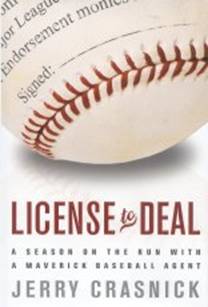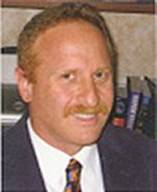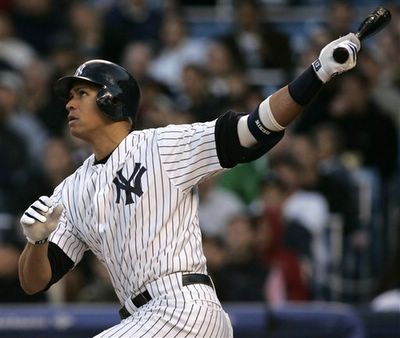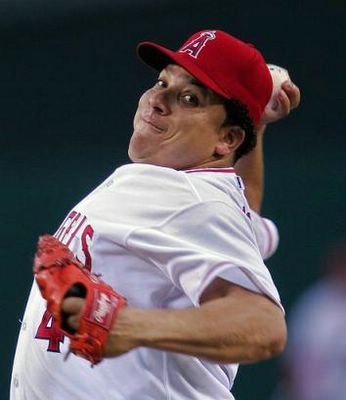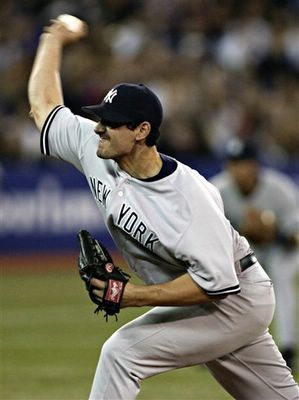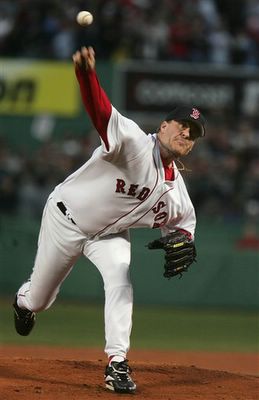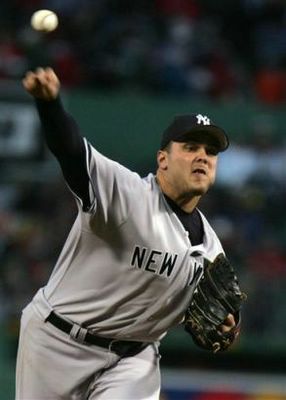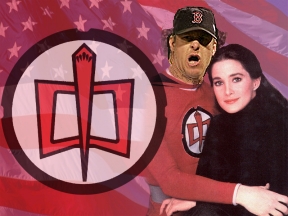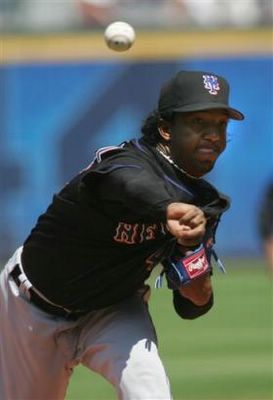Have you sene these men?
A B
Robles Olmedo
Repko Oscar
Werth Mike
Saenz Cody
Perez Mike
Edwards Jayson
Ross Jason
Rose Antonio
More importantly, do you even know who they are? Can you match the first names in column A with the last names in column B?
Well, if you live on the Left Coast and/or you bleed Dodger Blue, you know exactly who they are. They are, or were, the starting lineup for the Los Angeles Dodgers as they closed out a four-game series against the hapless Colorado Rockies, themselves a refuge for obscure baseball players, on July 7th, 2005. If you matched all the names correctly, without first looking up the Dodgers roster online somewhere, well, congratulations, Mr. Tracy, but you should probably be paying closer attention to the game, don't you think?
Let's look at that list again, with a little more info, shall we?
Name, Pos Age pre-05 AB 2005 AB pre-05 G 2005 G
Oscar Robles, ss 29 0 66 0 34
Jason Repko, cf 24 0 136 0 63
Jayson Werth, lf 26 384 146 130 40
Olmedo Saenz, 1b 34 1055 164 429 57
Antonio Perez, 2b 25 138 152 61 46
Mike Edwards, 3b 28 4 111 4 44
Cody Ross, rf 24 19 20 6 11
Mike Rose, c 28 2 25 2 9
Total N/A 1602 820 632 304
Average 27 200 103 79 38
That's eight players who had compiled a total of about three "player-seasons" worth of at-bats before the start of the 2005 season, and nearly two-thirds of those come from 34-year old journeyman Olmedo Saenz alone. Even this season, not one of these guys has been a regular to this point in the season. Fully half of this lineup had not amassed more than six major league games apiece in their careers before April 2005, including two who debuted this season. All-told, these eight players have an average of less than one season worth of game experience, more than half of that coming from Olmedo Saenz, the "clean-up" hitter, who's never hit more than 11 homers or compiled more than 41 RBI in a season.
Not surprisingly, this lineup didn't win, couldn't even beat the Rockies, who entered the game sporting the worst record in the NL at 29-54. Why, do you ask, would the Dodgers run out a lineup that had so little experience and arguably, so little chance of winning? Well, as is the case with many of the strange occurrences during baseball season, Lady Luck is to blame.
To say that Lady Luck has been less than kind to the Dodgers this season would be an understatement exceeded perhaps only by something like, "That Hitler was not a nice man." Lady Luck has not just robbed the Dodgers, but humiliated them in the process, and multiple times. She's lured the Dodgers into a false sense of security, and then handcuffed them to the bed in a cheap motel room while she stole their money, their credit cards, their watch, and not yet satisfied, their suit from Moe Ginsberg.
Let's recap, shall we?
April 3rd:
*RP Eric Gagne goes on the 15-day DL w/ right elbow injury;
*SP/RP Wilson Alvarez goes on 15-day DL w/ left shoulder tendinitis
*OF Jayson Werth goes on 15-day DL w/ fractured left wrist
*SP Brad Penny goes 15-day DL w/ right biceps injury
*SP/RP Darren Dreifort transferred to the 60-day DL
These things all happened on one day as the season was beginning. Alvarez would come off the DL on May 4th, pitch badly for a month, and then get placed on the DL again on June 6th with the same injury. Gagne similarly would come off the DL on May 15th and pitch for a month (very well, in fact) only to be placed back on the DL on June 16th, with a season-ending elbow injury. His replacement in the pen, Yhency Brazoban, has a 5.09 ERA. Penny came back in late April and has had one really bad start for every two good ones, and he's been their best starter to date. Werth returned in late May but has hit only .245 with four homers while playing essentially every day since. Dreifort still hasn't pitched this year, and probably won't.
May 5th:
*IF Jose Valentin goes on 15-day DL w/ sprained right knee
Valentin had hit a career-high 30 homers for the White Sox last season, despite a .216 batting average, and was being counted on for some much needed pop at the hot corner. Instead he hit .194 for a month and then got hurt. Japanese 3B Norihiro Nakamura, a star power hitter in his native Japan, hit only .128 in part time duty for the first month of the season and was designated for assignment. He's currently hitting .289 with power for AAA Las Vegas, but everybody can hit homers in the PCL, so that doesn't say much. Rookie Mike Edwards, an out-of-place outfielder, and Antonio Perez, an out-of-place shortstop, have split duties at third base for most of the year. Overall, Dodgers thirdbasemen have hit .258 with five homers combined. They have a .706 OPS, which is better than only two teams in the NL (Philadelphia and Florida) and 24th out of the 30 Major League teams.
May 24th:
*SP Odalis Perez goes on 15-day DL w/ left shoulder soreness
*IF Jose Valentin transferred to 60-day DL
Perez just returned to the team last week, on July 5th. He has now pitched twice since his return, surrendering 4 earned runs in five innings of work each time, to raise his ERA to 4.97. The Dodgers lost both games. He was doing the team more good on the DL.
May 28th:
*C Paul Bako goes on 15-day DL with a knee injury, forcing to Dodgers to call up one-time Yankees prospect Dioner Navarro, who doesn't get into a game before being sent back to Las Vegas three days later, when rookie C Mike Rose is brought up. Dodgers catchers have combined for a .669 OPS, third-worst in the NL and 23rd of 30 MLB teams.
June 3rd:
*OF Milton Bradley goes on 15-day DL w/ torn ligament in right ring finger
Bradley had been hitting .298 with ten homers, one of the few bright spots in a Dodgers lineup that currently ranks 24th of 30 MLB teams in run scoring. The only game Milton Bradley's been able to play since is Candyland.
June 8th:
*OF Ricky Ledee goes on 15-day DL w/ strained left hamstring, forcing the Dodgers to recall OF Jason Grabowski, who has been on the DL since the May 18th. As he was doing before his injury, Grabowski resumes hitting about a buck-fifty in spotty playing time.
June 29th:
*SS Caesar Izturis strains an already weak hamstring legging out a bunt. He will be placed on the 15-day DL July 5th.
Izturis had been playing injured for almost a month, and it showed, as he was hitting only .105 (that's right: one-OH-five) in June and hadn't gotten a hit in 20 at-bats before beating out a bunt in the 5th inning. That play apparently strained the hammy enough that they finally caved in and placed him on the DL as well, making rookie Oscar Robles the starter at short. To his credit, Robles has played well, hitting .357 overall, including .457(!) in July.
July 4th:
*OF J.D. Drew goes on 15-day DL w/ broken left wrist
Drew sustained the injury being hit by a pitch from Arizona lefty Brad Halsey, whom I didn't think could break a pane of glass with his fastball, much less a human bone. Drew was hitting reasonably well at the time, batting .286 with 15 homers, but only 36 RBI thanks to a .218 batting average with runners in scoring position. The Dodgers had hoped for more from him after he hit .305 with 31 homers and a dozen steals for Atlanta in 2004. They signed him to a five-year, $55 million contract in the off season hoping he would give them some of the offense they'd miss with the departures of Steve Finley, Shawn Green and Adrian Beltre in the off-season. I'm sure they'd take whatever they could get from him now.
Furthermore, placing Drew on a DL that already included Ricky Ledee and Milton Bradley forced the Dodgers to an all-Ja(y)son outfield: Werth, Grabowski and rookie Repko. Not exactly Snider, Furillo and Robinson out there, you know?
Adding injury to insult, secondbaseman Jeff Kent pulled a hamstring on July 5th, and had to miss a few games to let it heal. With lefty Joe Kennedy going for the Rockies on Thursday, and usual firstbaseman Hee Seop Choi hititng .158 against southpaws this season (and an alarming .132 for his career!), manager Jim Tracy apparently thought it better to start someone (anyone!) else at first base that day, so Saenz got the nod.
Mercifully, Ledee was taken off the DL on July 9th, but a 31-year old who's never gotten to the plate 300 times in a season in his major league career is not the savior Los Angeles needs. Neither, for that matter, is rookie Ching Feng Chen, whom they brought up to take Drew's spot on the roster.
That same day, relief pitcher Kelly Wunsch was placed on the DL with torn ligaments in his ankle. Wunsch had an unimpressive 4.56 ERA, but he also had 15 "Holds" in 24 innings spanning 45 appearances, a LOOGY if ever there was one. His loss leaves the Dodgers' bullpen without a lefty of any kind.
Also mercifully, Kent's injury was not season-threatening and he was back in the lineup this weekend, going 6-for-10 in three losing causes as the Astros swept them. At least he's healthy, even if the Dodgers aren't.
So, as I mentioned, with Drew, Izturis, Bradley, and Valentin on the DL, and with Kent unavailable and Choi useless against lefties, Tracy sent the aformentioned lineup of novices out there to get their butts beaten by the Rockies last Thursday. Originally I started this column with the thought that I might have stubmled upon the least experienced major league lineup in decades, if not a century. But I don't have any way to easily verify this, and besides, that's not all that important.
What's more important, at least if you're a fan of the Dodgers or one of their NL West competitors, is where they're going in the future. In my estimation, unless there's some miracle that occurs between now and October, I expect the Dodgers to continue giving lots of playing time to a bunch of guys you wouldn't know if you caught them breaking into your house. Moreover, the once-proud Dodgers will continue their downward trend, and end up battling the Rockies for third place in their division.

R.I.P 2005 Dodgers


